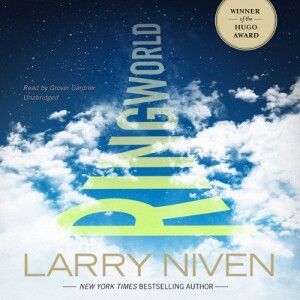 Louis Wu is 200 years old, and he’s bored. It’s his 200th birthday, and he’s using transfer booths to extend the celebration of it for a full twenty-four hours, and he’s really bored.
Louis Wu is 200 years old, and he’s bored. It’s his 200th birthday, and he’s using transfer booths to extend the celebration of it for a full twenty-four hours, and he’s really bored.
Then, when transferring from one birthday location to another, he winds up someplace else entirely. An entirely mundane hotel room, occupied by an alien. Specifically, a Pierson’s Puppeteer, a being with two small heads on snake-like necks, three hooved legs, and its brain housed in its main body, rather than either of the heads. When Puppeteers are speaking in their own language, the effect is often orchestral. This particular Puppeteer has chosen the human-pronounceable name of Nessus. Nessus has a plan to alleviate Louis’ boredom.
At first Nessus is very cagy about what exactly his plan is, but it certainly involves space travel, the Puppeteers’ better, faster hyperdrive they’ve never shared with humans or kzinti, and they need to recruit two more crewmates–a kzin, and another human, one who is the product of Earth’s Birthright Lotteries.
The kzin they recruit is Speaker-to-Animals, a very junior member of the Kzinti diplomatic delegation to Earth, with only a title and no name earned yet.
The other human, Teela Brown, is the product of five generations of ancestors who were all born due to their parents having won the birthright lotter for that year. Teela Brown, Nessus says, is very lucky. Teela’s luck will help them succeed.
Left unexplained or even examined at this point is why someone so lucky would wind up on a dangerous mission to an unknown destination for unexplained reasons. Kzinti are bold and reckless. Louis is bored and in the habit of taking a “sabbatical” into space periodically. But why Teela?
When they learn what their destination is–a compromise version of a Dyson sphere, an enormous ring around a G-class star–there’s a renewed discussion of whether they’re going, but the promise of the improved star drive is a powerful lure, The ring is approximately the diameter of Earth’s orbit, and the ring itself is about a million miles wide. Nessus says the Puppeteers want to investigate it to be sure it’s not a threat. Nessus is the only Puppeteer insane enough to do such a thing; hence the need for human and kzinti crew to join him. (Puppeteers are committed, devout cowards, and their argument that this is just sanity is more convincing than one might expect.)
Of course, trouble starts as soon as they reach the Ringworld, and they soon find themselves crashed on it with a crippled ship, and exploring the world via flycycle.
It’s a world fallen into barbarism, with the civilization that built it fallen for reasons the current inhabitants are unable to explain. Yet not all of the old tech of the Ringworld Engineers whom the barbarian inhabitants now worship as gods has completely failed. Some of it works–no always reliably, and often dangerously.
Personality conflicts and divergent goals start to emerge, with some impressive resulting conflict. Which doesn’t necessarily sound exciting, but it really is. Nessus’ ultimately self-interested cowardice, Speaker-to-Animals’ warlike nature, Teela’sobliviously unaware carelessness due to never having actually been hurt (she’s never even stubbed her toe), and Louis’ reasoned determination to keep this misfit crew working together while stranded on the Ringworld makes for complex and interesting interactions and adventures. It’s further enriched by Louis’ gradual realization that every single one of them, including Teela, is intelligent and brings insights the others don’t, and which are important to their survival and success.
What contemporary readers may find subtracts from their enjoyment is the fact that Niven is frustratingly sexist. Both of the women in the book are quite stereotyped, while Louis, Speaker-to-Animals, and Nessus are well-rounded, interesting characters, different from each other in ways that makes sense both for their species and their life experiences. Teela and the other woman they eventually meet, who has a very long name and like Louis I’ll simply call her Pril, are frustratingly one-dimensional. This remains true even though they’re both quite clearly established as intelligent. I’ll just mention here that I use “sexist” quite intentionally. Having read most if not all of his work prior to his collaborations with Pournelle, and having met him in circumstances that are a great opportunity for a man to show his worst traits, I can’t agree that he’s a misogynist. Just, sadly sexist. Even greatly intoxicated, I found him to be a charming and kindly gentleman. Perhaps that’s why I can still enjoy Ringworld enough to give it five stars.
Sexist, he is. A really good writer he also is, and this is a heck of a good read.
The narrator is Grover Gardner, who also narrates under the names Tom Parker and Alexander Adams. For some reason, both “Grover Gardner” and “Tom Parker” are listed on the edition I received as narrators. Regardless of that oddity, he does an excellent job. His voice is easy to listen to, and he does an excellent job of making the voices of the main characters distinct and individual.
Recommended.
